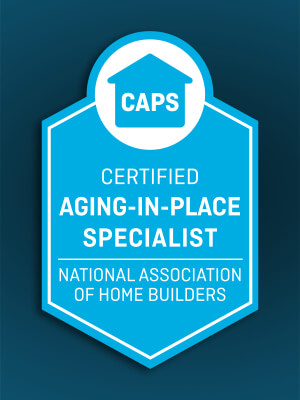What is CAPS Certification?

Thanks to the Great Recession, advances in healthcare raising the average life expectancy, and other factors, the senior housing landscape has changed in recent years. Baby Boomers are increasingly preferring to stay in their homes rather than move into senior care facilities. In fact, homeowners aged 55 and older account for half of all home improvement spending today, according to a recent Harvard study.
This practice is known as aging in place (AIP), which SeniorLiving.org defines as modifying your home to address the health, social, and emotional needs you may face as you reach your twilight years. As this type of remodeling involves multiple disciplines, including construction, occupational therapy, and healthcare, the Certified Aging-in-Place Specialist (CAPS) certification was developed – with the help of our own president and founder Dan Bawden – to train general contractors, remodelers, interior designers, and other professionals in this fast-growing segment of the real estate industry.
How Builders Become CAPS Certified
CAPS was developed in 2001 by several divisions of the National Association of Home Builders (NAHB), in cooperation with the AARP, and is administered by the NAHB. To become certified, you must first pass three required courses:
- Marketing and Communicating with the Aging in Place Client (CAPS I) is designed to help the specialist effectively communicate the benefits and details of aging in place with interested homeowners.
- Design Concepts for Livable Homes and Aging in Place (CAPS II) explores the design, legal, and practical considerations of building or remodeling a home for AIP.
- Details and Solutions for Livable Homes and Aging in Place (CAPS III) delves into the actual handiwork of remodeling a home, covering the latest products and techniques being employed today.
Classes are usually held over three-day periods at building supply stores, builders’ association offices, conference centers, or the like. A typical class runs from 9 a.m. to 5 p.m. Visit the NAHB’s Education and Events page to find upcoming classes in your area.
Prices vary by area but average national fees run $279 per course (as above, there are 3 courses to complete) for members and $419 per course for non-members. Graduation fees are either $75 or $145 (for the premium option) for members, and $110 or $218 for non-members. Annual renewal fees cost members $55, and non-members $83.
You’ll also be required to take the CAPS code of ethics pledge, as well as complete 12 hours of continuing education every three years.
Working with a Certified Aging-in-Place Specialist
Although seniors make up a large portion of the homeowners investing in AIP modifications, they’re not the only ones who may be interested in engaging a CAPS-certified contractor. Those with elderly family members or friends who visit often may find it beneficial to alter an individual bathroom or in-law suite where they can welcome guests. As with all home remodeling projects, AIP jobs can take weeks or even months, so getting started before a family member is in dire need of changes is always the best option.
In any case, choosing a builder with a CAPS designation is more advisable than simply having a non-certified contractor attempt an AIP remodel. CAPS pros have been trained to understand the lifestyles and concerns of older people, as well as how to balance the practical side of aging in place with the aesthetics of a beautiful home. He or she can work with an occupational therapist and help you decide what updates to make, based on your particular needs and wishes.
Some of the most common AIP improvements include:
- Grab bars and rails in the shower, beside the toilet, and near the bed help prevent falls in seniors with mobility problems. Estimated cost: $150 for three bars.
- Walk-in tubs and showers that have the step removed are an extremely common bathroom update for older people. Estimated cost: $1,500-$2,000 for the shower, $5,000-$7,000 for the tub.
- Widened doorways and ramps, both inside and outside, allow users of walkers or wheelchairs to move through the house more easily. Estimated cost: $100-$250 per foot for outdoor ramps, $200-$2,000+ for automatic doors.
- Smart technology such as sensors, cameras, and health alerts can work in conjunction with smartphones to make elderly residents’ lives both safer and more convenient. Estimated cost: varies. Installing a smart thermostat averages $170, while three to four security cameras runs about $1,000, for two examples.
- Kitchen modifications that make features like the sink, the microwave, and the counter more accessible from a seated position. Estimated cost: varies, but expect to spend at least $15,000.
- Touchless faucets for arthritis sufferers. Estimated cost: $150-$275+.
- Flooring updates such as anti-slip coating in the bathroom and thinner carpeting can limit trips and falls. Estimated cost: $7-$12 per square foot for new carpet, $1-$4 per square foot of non-slip flooring, depending on the material.
To find a CAPS builder in your area, you can search the NAHB’s online directory of professionals with home-building designations. Type “CAPS” in the search bar and filter by your city or zip code to see a list of CAPS and their contact information.
CAPS & Legal Eagle Contractors’ Owner Dan Bawden
When it comes to aging in place work, few general contracting companies have the pedigree that Legal Eagle has, thanks to our owner and president Dan Bawden. Dan, a former Chairman of NAHB Remodelers, helped craft the CAPS certification program, and today he continues to be at the forefront of this aspect of the remodeling industry as an accredited CAPS instructor. In fact, the NAHB recently named him the National Instructor of the Year.
Spurred by Dan’s passion for improving the lives of seniors, Legal Eagle has successfully completed numerous aging in place projects for our clients who need special accommodations. Learn more about our aging in place services.






